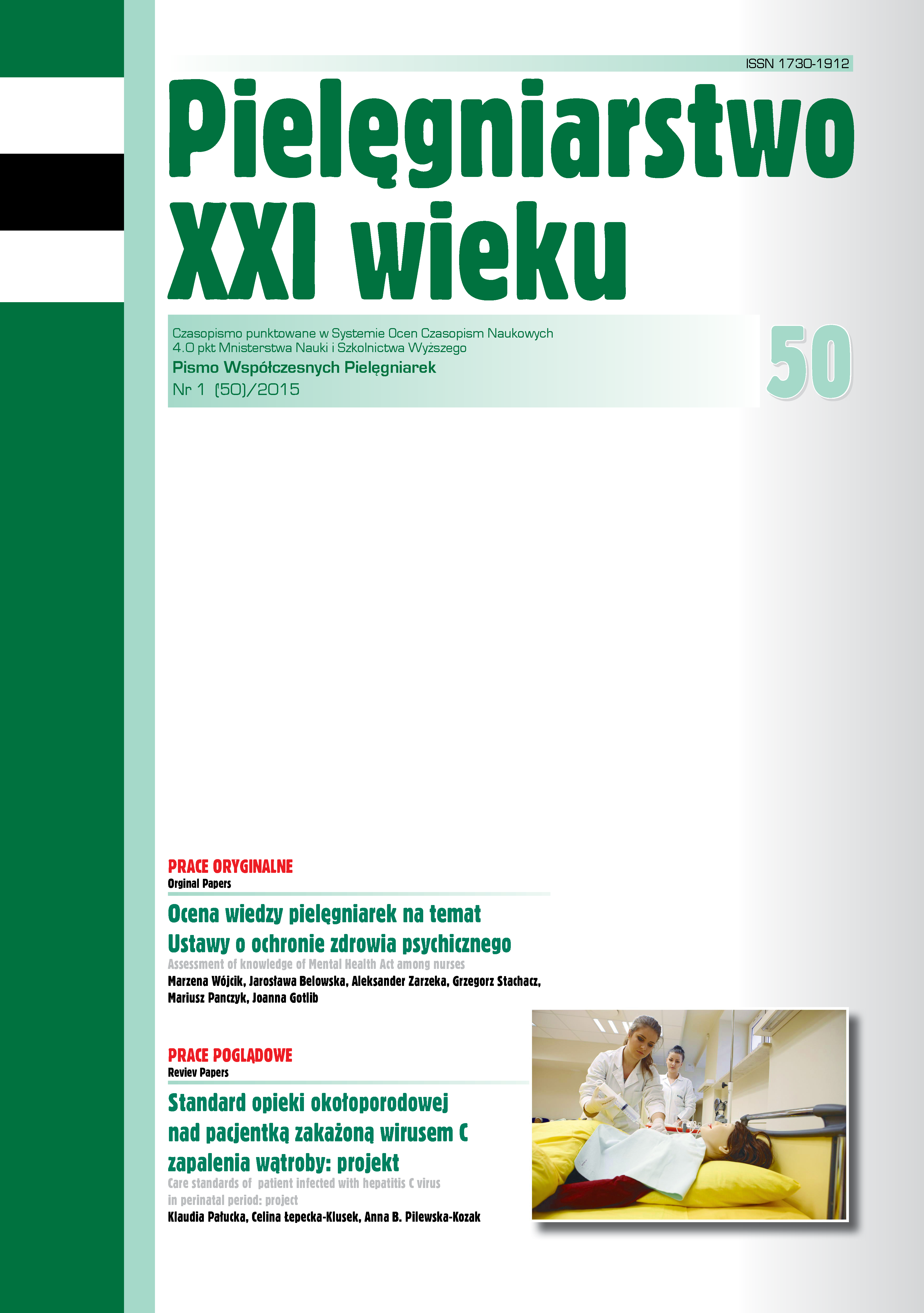The country dwellers’ knowledge of colon cancer
DOI:
https://doi.org/10.12923/p21w-2015-1/06Keywords:
knowledge, colorectal cancer, prophylaxisAbstract
THE COUNTRY DWELLERS’ KNOWLEDGE OF COLON CANCER
Aim. The analysis of the adult country dwellers’ knowledge of colon cancer.
Material and methods. 100 adult inhabitants of Oleśnica (a village in Masovian Voivodeship of Poland.) They filled out a voluntary and anonymous questionnaire survey consisting of 13 questions. The collected material has been analyzed and described. The values of the analyzed parameters have been measured in a nominal scale and characterized with the use of numbers and percentages.
Results. The majority of respondents were not aware of any ways to prevent colon cancer. Most of them found colonoscopy the most significant diagnostic examination. A large proportion of the people surveyed claimed that preventive screening was not easily available. Nearly a half of the subjects pointed to mass media as the most reliable source of knowledge about colon cancer. Also, they subjectively claimed that their knowledge about colon cancer was not sufficient.
Conclusions. The surveyed group had little knowledge of colon cancer. According to the respondents there is difficulty in an access to preventive screening for country dwellers. Country dwellers did not value the health education provided by healthcare professionals.
References
1. Didkowska J, Wojciechowska U, Zatoński W. Nowotwory złośliwe w Polsce w 2011 roku. Raport roczny dla MZ, Warszawa 2013.
2. Otto W. Rak jelita grubego w świetle współczesnych badań podstawowych i klinicznych. Kształcenie podyplomowe. 2012; 2 (5): 7-19.
3. Wojciechowska U, Didkowska J. Nowotwory w Polsce w 2012 roku. Nowotwory. Journal of Oncology. 2013; 63 (3):197-216.
4. Kaminski MF, Regula J, Kraszewska E, et al. Quality indicators for colonoscopy and the risk of interval cancer. N Engl J Med. 2010; 362: 1795-803.
5. Regula J, Rupinski M, Kraszewska E et al. Colonoscopy in colorectal-cancer screening for detection of advanced neoplasia. N Engl J Med. 2006; 355:1863-72.
6. Kordek R. Onkologia- podręcznik dla studentów i lekarzy. Wydawnictwo Medyczne Via-medica: Gdańsk; 2007.
7. Jinjuvadia R, Lohia, P, Jinjuvadia, C, et al. The association between metabolic syndrome and colorectal neoplasm. Systemic review and metaanalysis. J Clin Gastroenterol. 2012; 47: 33-44.
8. Klimczak A., Malinowska K., Kubiak K. Choroby nowotworowe a żywienie. Pol. Merk. Lek. 2009; 27 (159): 242-244.
9. Wronkowski Z, Brużewicz S. red. Nowotwory jelita grubego. Warszawa: Wydawnictwo Lekarskie PZWL; 2008.
10. Jelski W., Orywal K., Kędra B. i wsp. Dehydrogenaza alkoholowa i aldehydowa jako markery nowotworowe i czynniki nasilające karcinogenezę w raku jelita grubego. Pol Merk Lek. 2008; 24 (144): 506.
11. Half EE, Mlynarsky L, Naftali T i wsp. False negative fecal occult blood test may be as-sociated with increased mortality from colorectal cancer. Dig Dis Sci. 2013, published online 22 May 2013. Dostępny pod adresem: http://www.eonkologia.pl/Rak-jelita-grubego-u-chorych-z-negatywnym-wynikiem-badania-kalu-na-krew-utajona-,8996. html [06.08.2014 r.]
12. Samadder NJ, Curtin K, Tuohy TM i wsp. Characteristics of missed or interval colorectal cancer and patient survival: a population-based study. Gastroenterology. 2014; 146 (4): 950-60.
13. Townsend CM Jr, Beauchamp RD, Evers BM, Mattox KL, Chirurgia Sabistona. Jama brzuszna. Tom 4, Wydawnictwo Elsevier Urban&Partner: Wrocław; 2013.
14. Wojciechowska U, Didkowska J, Zatoński W. Nowotwory złośliwe w Polsce 2010 roku. Centrum Onkologii – Instytut: Warszawa; 2012.
15. Sapiełkin B, Gotlib J. Wiedza pacjentów oddziału endoskopii na temat profilaktyki i leczenia nowotworu jelita grubego. Pielęgniarstwo XXI Wieku. 2013, 2 (43): 23-27.
16. Wojciechowska U, Didkowska J. Zachorowania i zgony na nowotwory złośliwe w Polsce. Krajowy Rejestr Nowotworów, Centrum Onkologii - Instytut im. Marii Skłodowskiej-Curie. Dostępne na stronie: http://onkologia.org.pl/raporty/ [06.08.2014 r.].
17. Król SK, Kapka-Skrzypczak L. Nowotwory jelita grubego jako poważny problem w Polsce i na świecie – kwestie medyczne i środowiskowe. Medycyna Środowiskowa - Environmental Medicine. 2011; 14 (4): 75-80.
18. Banaszkiewicz Z, Tojek K, Jarmocik P, i wsp. Kliniczne objawy raka jelita grubego – badanie retrospektywne. Współczesna Onkologia. 2009; 13 (1): 34-40.
19. Helfand M, Marton KI, Zimmer-Gembeck MJ, Sox HC Jr. History of visible rectal bleeding in a primary care population. Initial assessment and 10-year follow-up. JAMA 1997; 277: 44-8.
20. Dunne JR et al. Preoperative anemia in colon cancer: assessment of risk factors. Am Surg. 2002; 68: 582-7.
21. Leis VM et al. Risk factors predictive of positive findings at colonoscopy. Curr Surg. 2001; 58: 227-9.
22. McFarlane ME, Rhoden A, Fletcher PR, Carpenter R. Cancer of the colon and rectum in a Jamaican population: diagnostic implications of the changing frequency and subsite distribution. West Indian Med J. 2004; 53: 170-3.
23. Saidi HS, Karuri D, Nyaim EO. Correlation of clinical data, anatomical site and disease stage in colorectal cancer. East Afr Med J. 2008; 85: 259-62.
24. Langenbach MR, Schmidt J, Neumann J, et al. Delay in treatment of colorectal cancer: multifactorial problem. World J Surg. 2003; 27 (3): 304-8.
Downloads
Published
Issue
Section
License
Copyright (c) 2024 Aneta Dmowska-Pycka, Katarzyna Adamiak (Autor)

This work is licensed under a Creative Commons Attribution 4.0 International License.




